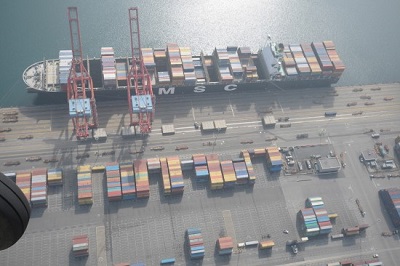Labor Dispute: Maersk Bypasses Oakland
U.S. West Coast port operations resumed in full on Monday after loading and unloading was stopped over the weekend as part of an on-going labor dispute. However, Maersk has stopped taking bookings for cargo bound for Oakland on two of its services because of severe congestion at the Californian port.
Containers will instead be discharged at Los Angeles or Long Beach. Maersk operates the largest US-flagged fleet, with more than 20 containerships, and the news agency Lloyd’s Loading List reports that Maersk Line has described the Oakland situation as “critical”.
The Pacific Maritime Association (PMA) has said that a major snag in negotiations with the International Longshore and Warehouse Union, ILWU, is its demand to be able to fire any arbitrator who rules against the union. Explaining the issue on Monday, PMA said that this provision would give the ILWU veto-power over arbitrators’ rights to prevent union slowdowns, and in so doing would threaten the consistent and reliable movement of cargo through West Coast ports.
“The ILWU is essentially seeking the right to fire judges who rule against them,” said PMA spokesman Wade Gates. “The waterfront arbitration system is an essential check-and-balance against illegal labor actions. It would be reckless to allow a single party to change the rules as the union desires.”
Currently, once an arbitrator has been hired, they can only be removed by mutual consent of the parties. The ILWU is seeking to change this provision so that either party could remove an arbitrator at the end of any contract. PMA strenuously objects to this attempt to damage the system that has protected the waterfront for decades.
The ILWU released a statement on the same day saying: “West Coast ports re-opened Monday morning after employers closed the docks for two days, increasing delays for customers needing containers. The union remains focused on reaching a settlement as quickly as possible with employers. Talks to resolve the few remaining issues between the Longshore Union and Pacific Maritime Association are ongoing.”
 The union has released photos that it says demonstrate that there are acres of asphalt waiting for the containers that sit on dozens of ships outside the Ports of Los Angeles and Long Beach, and sufficient space for thousands of containers on the docks.
The union has released photos that it says demonstrate that there are acres of asphalt waiting for the containers that sit on dozens of ships outside the Ports of Los Angeles and Long Beach, and sufficient space for thousands of containers on the docks.
“The PMA has told the media that the ports are too full to receive cargo, but the photos tell another story. And though the docks are clear, the transportation chain (intermodal squeeze from export energy trains and chassis shortage) remains congested due to factors outside of the scope of the ILWU.”
The port of Oakland has issued a statement saying that the impact of the dispute is being felt worldwide. “Global supply chains - especially between Asia and the U.S. - have been disrupted. Multinational companies are reporting lost revenue and increased costs because they can't get products from overseas sources to markets or manufacturing centers.

that matters most
Get the latest maritime news delivered to your inbox daily.
“The labor impasse and cargo buildup jeopardize the credibility and standing of West Coast ports. Shippers and ocean carriers are losing confidence in the reliability of the ports. They're diverting cargo to other gateways in Canada, Mexico or through the Panama and Suez canals to the U.S. East Coast.
“The West Coast waterfront labor impasse needs to be settled... quickly. Importers and exporters are suffering significant cargo delays. Central Valley farmers can’t ship their produce. Small business owners can’t get goods to put on the shelf. Harbor truckers can’t do their jobs. Everyone is suffering. If the situation, worsens... if West Coast ports shut down, the U.S. economy and the global supply chain will be jeopardized. In the San Francisco Bay Area, 73,000 jobs that depend on the Port of Oakland will be at risk. The impasse is good for no one. It is time to reach agreement on a new contract and put the disruptions and delays behind us.”
